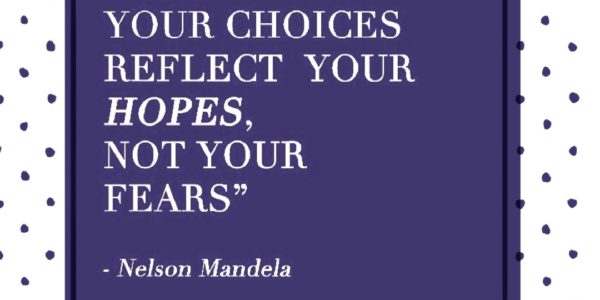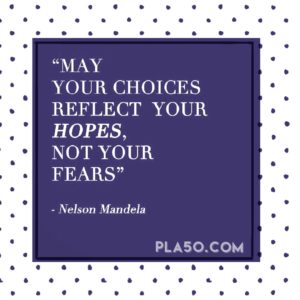by Connie Minnell On today's show I talk about what goes into making good decisions. I'll share the four roadblocks of indecision that we need to look out for, and I'll give the five steps to prevent them from happening. We'll look at how depression, stress and age can affect decision making, and I'll tell how a good memory can cause poor choices. I'll share a true story about how one man had to rescue his mother from a poor financial decision and I'll give the five steps to making better choices in midlife. And finally, I'll talk about how the decisions we make every day create our unique life and build our legacy.
We have a great diversity in our lives, and all of the things needing our attention can really cause some stress. Our decisions affect our relationships, finances, and futures. But sometimes all those demands on us can cause us to become temporarily frozen from deciding what to do. Our system shuts down and we retreat to our “safe place” –that's what indecisiveness equals– being stuck. Decisions can become harder to make for reasons like depression, stress, and age, or even having a good memory!
Depression When you get depressed you are less likely to go with your gut instinct. In an article in research digest, Carina Remmers and her colleagues tested 29 patients diagnosed with major depression and found that the people with depression had an impaired ability to go with their gut instincts. Disclaimer: If you are seriously depressed, or if you think you ave had symptoms of depression for more than a few weeks, please see you doctor, because I'm not one, and this podcast is for entertainment purposes only.
Stress Stress can affect our bodies and our abilities to make good decisions. In the podcast, I share a story about how stress during my last year at work caused my lack of decision, which became my decision and it affected my health in a negative way.
Age Another thing that affects decisions is our age. Studies have shown that as we age, we begin to rely more on our instincts and our past experiences when we make decisions. Age affects decision making also. As people age, many are taking greater financial risks. Some of us to have to make decisions on behalf of our parents. My friend John had to take over his mothers bills and accounts because she was giving money to a charity and not paying her bills. The people from the charity were tugging on her heart strings, so she gave them a large amount of money that she couldn't afford. I tell you what he had to do in the audio.
A (Really) Good Memory Researchers at the University of Chicago and Michigan State University studied a group of people with a high working memory but who freeze when making decisions. The study shows that people who have high working memory brain usually rely on those resources to solve hard problems, but if they also have a poor attention span then they get distracted easily. This then causes them anxiety, and it's that anxiety that gets them to freeze up when the pressure is on.
The choices we make tell a lot about who we are and what makes us unique. But living with the results of those choices, or lack thereof, can sometime cause anxiety and even regret. The thoughts that you have every day influence the decisions that you make, and those decisions have everything to do with what your life is. As long as you're alive, you're making choices and those choices represent what is important to you. Character traits develop as you respond to the choices that you make.
Decisions can be stressful especially when you don't feel good or someone else in your family is sick. Before you know it, you let your emotions decide for you, or you just do nothing. Philosopher Ruth Chang calls this “drifting” She says that people who don't exercise their own power of decision-making when faced with hard choices are called drifters. Drifters allow the world to, as she says, “write the story of their lives.” I relate drifting in life to the story of watching a stick in the stream. The stick, drifting fast down the stream, sometimes forward, sometimes spinning in circles, sometimes getting stuck.
5 steps to help you make those decisions with confidence
Step 1 Let your choices be a reflection of your hopes, not your fears
Big decisions can wreak havoc on your emotions… emotions get in the way of decisions, and that clouds your judgment. Fears can take many faces; fear of failure or pain, fear of what others will think, fear of perfectionism, fear of success, If you cant make a decision, there's a good chance that you're afraid of something. Identify the fear, learn more about it, conquer it, and move on. Make the decision that's best for you. Best-selling author, Seth Godin says, “You don't need more time in your day, you need to decide.” Don't make major decisions when you are visibly hurt, stressed, angry. Never make a decision that will purposefully hurt someone else. Good decision making includes keeping your honor and integrity. (My decision to take early retirement is discussed.)
Step 2 Do your Research, but stay focused and set a deadline
Even if you don't meet the self imposed deadline, you will be closer to a good decision than with no deadline. Have you ever looked up a certain illness on the Internet and been completely overwhelmed with the information? Doing too much research can lead to even more stress and overload us with information that we don't need. Pull back from those distractions. There is so much information available at our fingertips, so it's important to remember to look at the research with a discerning eye and stay focused on the specific questions you need answered to make your decision.
As you investigate the options, write down simple and specific information a way that's best for you. You could use the traditional pros and cons list on a yellow notepad, or write down your findings on sticky notes and assemble them into categories similar to using an affinity diagram. the main thing to remember is that you're not just relying on your instincts, you are also doing your research.
Some decisions, like how to handle a tough situation, are worth mulling over. Others, like deciding what you are going to have for supper tonight, are not. Don't fall into that trap of over analyzing the small decision. Ask: Will this matter 10 years from now? Sometimes decisions seem much bigger than they really are. Maybe you're struggling with whether or not to take that new job. You can quit your new job if it really horrible.
Step 3 Trust your instincts (your gut)
Our nervous system really does include our gut. When I'm stressed, I can feel it immediately in my stomach. Think about a person you love spending time with: They either make you feel safe or happy, or both. Now think about someone you can't ever please or get along with. how does your gut feel when you think of them? Relay that same test to each side of your decision. Remember the simple test of tossing a coin to decide when both sides were relatively equal. And before the coin even landed you knew which side you were hoping for? That's your instincts kicking in.
Don't be so hard on yourself if you can't decide. Even if you have both options, with all the advantages lined up on either side of the yellow tablet, and you think that there is no best option, then you just say that they are on par with each other. You look at the choices and think about how much value that you have give to each item on your list. and make the best decision that you can with that information. Remember, our decisions become our life. Our life becomes our legacy.
Step 4 Get the advice of a trusted friend, or two, and (I) pray or meditate on it
Reach out to someone you trust, someone who's been there or done that. Meditate on it or reach out to your higher power to help you become more focused on what you really want.
Step 5 Decide, accept, let go and move on
Finally, after you have made the choice, accept the fact that you made the best decision that you could with the information you had, in the time that you had, and using the wisdom that comes with your age. Let go of any further anxious feelings. Decisions have consequences, but how you handle those consequences are a reflection of your maturity. Every situation, no matter how bad, can be made better by our attitude. So if you make a poor decision and have to handle the consequences, then it is in those circumstances that attitude counts more than ever. Remember, even wrong decisions can lead to some pretty terrific outcomes, but even if they don't, you'll have a great story to tell and will have learned a valuable life lesson.
Thank you for being here! I'm so glad you decided to join me today!
You can visit my website at PositivelyLifeAfterFifty.com or pla50.com.
The following were mentioned in the show:
For the depression article referred click here.
Click here to watch Ruth Chang's TED Talk video
Read more about Decision Making Factors
People with higher working memory ability suffer more from brain freeze
Check out this episode!


